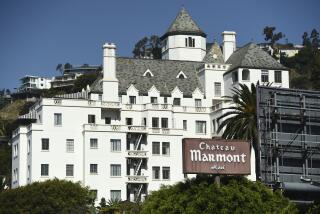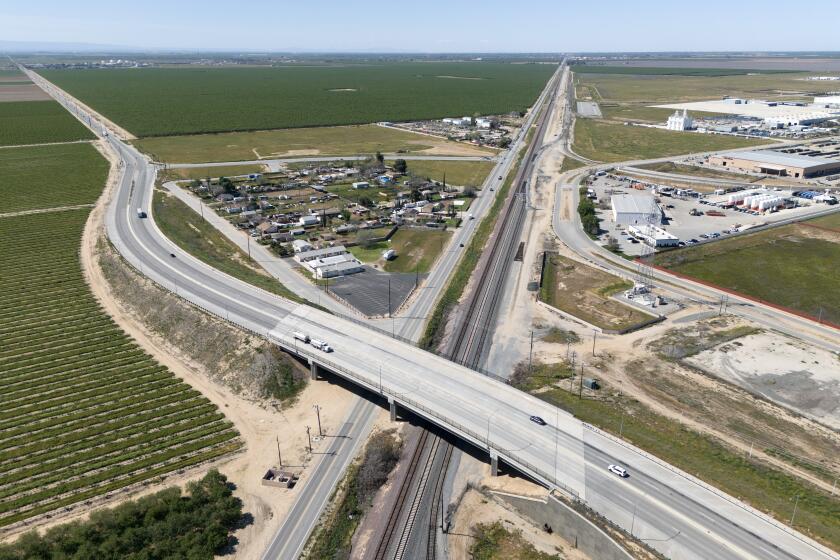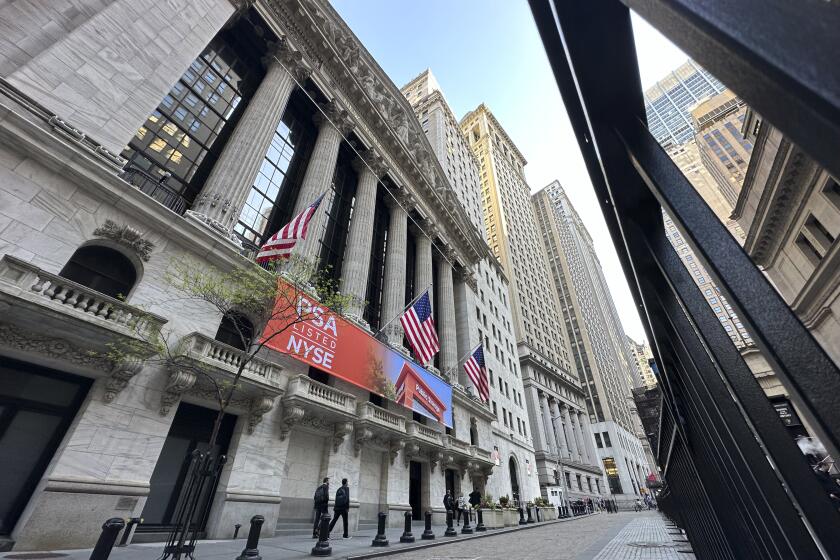Merger of May, Associated Faces Grass-Roots Opposition
The proposed merger between May Department Stores and Associated Dry Goods is on the verge of completion, but they’re fighting it on the grass-roots level in Burbank and Pennsylvania.
Late last week, Federal Trade Commission representatives were in Southern California to hear Burbank city officials tell why they think competition will suffer if the two merchandising giants join forces.
And last Tuesday, Pittsburgh’s city solicitor made his second appearance before the commission in Washington to tell why shoppers in that city might be hurt. After all, he said, if the deal goes through, May will control all conventional department stores in the area.
They’ve gone to the Federal Trade Commission because it has the power to review proposed mergers to see whether they will reduce competition. Since May started making its play for Associated in June, industry observers have speculated that the only sticking point might be government antitrust concerns.
The two retailers have overlapping operations in Southern California, Denver and Pittsburgh. May--based in St. Louis--owns May Co. California, May D&F; in Denver and Kaufmann’s in Pittsburgh. Associated, the New York-based parent of J. W. Robinson in Southern California, also operates Denver Dry Goods in Colorado and Joseph Horne in Pittsburgh.
On Friday, according to a May spokesman, May and Associated finished supplying documents about these operations that had been requested by the FTC. Under federal antitrust laws, the commission has 20 days to reach a decision about whether the $2.47-billion merger will hinder competition. In addition, the two companies said they have scheduled special shareholders meetings Oct. 3 to vote on the proposed merger.
Also on Friday, Burbank officials wrapped up two days of meetings with FTC representatives in La Jolla and Burbank and released a position paper filed Aug. 14 with the commission in Washington.
The document said: “We believe the proposed merger would have an adverse impact on competition, as the resulting Robinson’s-May Co. chain would control a market share in excess of 40% of the middle to upper department store market in Southern California.”
The catalyst for Burbank’s protest was May Department Stores’ announcement Aug. 13 that it had decided to withdraw Robinson’s as one of four anchor retailers at the Burbank Towncenter shopping mall. The mall, a 29-acre, $158-million project of Hahn Co., has been in the planning stages since 1971 and has been scheduled for completion in 1988.
After the announcement, Burbank City Manager Bud Ovrom contended that May was “calling the shots” for Robinson’s. He said speculation in the industry was that May Co. had wanted to enhance its position in Laurel Plaza in North Hollywood by getting Robinson’s and Nordstrom to open stores there but had failed because of those two stores’ commitments to the Burbank mall, which is about five miles away. May’s store in Laurel Plaza also houses the California division’s headquarters.
A May spokesman said the decision to withdraw the Robinson’s from the Burbank mall was made by Associated months before it agreed to the takeover by May. However, Kim Wenrick, a Hahn spokeswoman, said Robinson’s and Hahn executives had continued negotiating until recently.
“Things had happened in the development of the Towncenter which made the earlier agreement with Robinson’s no longer applicable,” Wenrick said. “But both parties had been working toward a new agreement.” The company would not elaborate.
Michael Gould, who in March resigned as Robinson’s chairman and is now president of Giorgio Inc., said Friday that early in the year he had raised “serious questions” with Hahn Co. about Robinson’s presence in the mall. Observers have noted that economic changes in the area surrounding the mall had made the idea of building a store there much less attractive.
“Under those conditions,” Gould said, “it was impossible for me to ask the Associated board in New York for approval.” Later, he said, Hahn sweetened the arrangements but not enough to suit him. Then, just before his departure, Hahn returned with another offer that “was so incredibly favorable that I felt Robinson’s would be able to make an acceptable deal.”
He said he was not certain about the progress of negotiations after he left the company.
In their position paper, Burbank officials said: “We believe Robinson’s commitment was withdrawn after years of planning solely due to the desire of May Co. to avoid competition to its nearby outlet in Laurel Plaza.” May Co. officials declined to comment on their plans for the Laurel Plaza store.
The stakes at Burbank Towncenter are getting high. Since May’s announcement that it will withdraw Robinson’s, officials of J. C. Penney, the Broadway and Nordstrom, the other three anchors, have said they are re-evaluating their commitments to the mall. City officials said the scheduled Oct. 27 ground breaking would be delayed at least 60 days so that the city and other stores committed to the mall can chart a new course of action.
City’s Side of Story
Ovrom said that in their meetings with Burbank officials, two FTC attorneys and an economist attempted “basically to get the city’s side of the story.”
“They were asking questions about how the whole shopping center industry works and about Burbank’s role in this specific issue,” he added. “They were painstakingly careful not to indicate to us which way they were leaning.”
Meanwhile, Paul Wilson, senior vice president of Richard Ellis Inc. in San Francisco, the firm that manages the Northridge Fashion Center, said plans to add a May Co. and a Robinson’s to that mall appear to be on, despite the merger.
“As far as I’m aware, it’s business as usual,” he said. “They’re both committed to the center. We’re all looking forward to opening both stores at Northridge.” He said that construction is scheduled to begin in January, with openings planned for August, 1988.
Los Angeles city officials said Friday that they are not concerned about effects of the proposed merger.
Industry observers have contended that Southern California customers may scarcely notice any changes if May Co. and Robinson’s move under the same corporate umbrella. If anything, some sources said, competition in this hot market could actually intensify as the two stores put more pressure on their two competitors--the Broadway and Bullock’s.
In Pittsburgh, however, City Solicitor Dan Pellegrini said competition would be severely restricted. Historically, the city has had three conventional department store chains: Kaufmann’s, owned by May; Horne, owned by Associated, and Gimbels. However, the Pittsburgh-area Gimbels stores were sold earlier this year to May, which announced that they would be converted to Kaufmann’s.
As a result, Pellegrini noted, May will control all of the conventional department store market once the merger is completed. Kaufmann’s and Horne will be co-anchors in the region’s six largest malls and the main downtown shopping district, he said.
“If the FTC does not oppose the merger, we will definitely file a suit to stop (it) unless May agrees to divest” one of the Pittsburgh divisions, probably Horne, he said.








